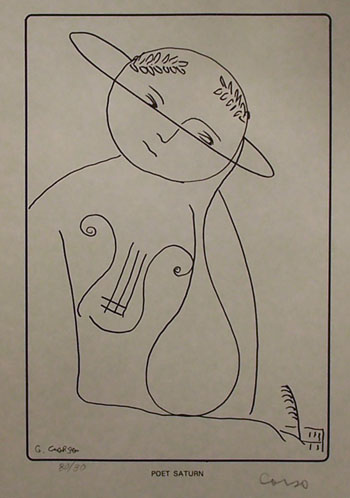
Poet Saturn – Gregory Corso – 1981
The Saturn Family series of prints was published in 1981 by The Parchment Gallery which was a venture of University of Charleston Professor William Plumley. The six piece set of signed prints were sold together as a portfolio and the edition was limited to 80. Correspondence between Corso and Plumley which I located while researching these pieces seem to indicate Corso had, at least initially, thought only one of the six was going to produced and even complained about having to sign so many.
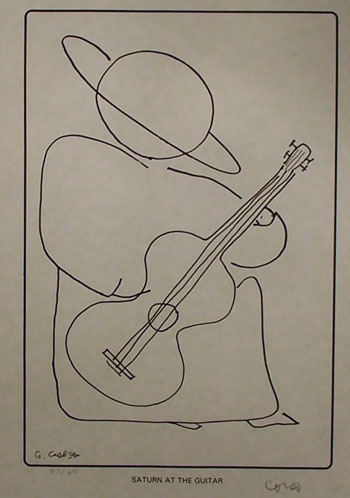
Saturn at the Guitar – Gregory Corso – 1981
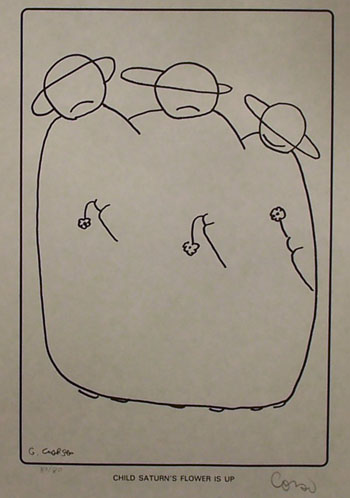
Child Saturn’s Flower is Up – Gregory Corso – 1981
According to the Academy of American Poets, Gregory Nunzio Corso was born in New York’s Greenwich Village on March 26, 1930, to teenage Italian parents. A year later, his mother moved back to Italy. After living in orphanages and foster homes, at age eleven Corso moved back in with his father, who had just remarried. After two years, however, he ran away; upon being caught he was placed in a boys’ home for two years. He was returned to his father, but after running away again was sent to Bellevue Hospital for three months “for observation.”
At age sixteen, he began a three-year sentence at Clinton State Prison for theft. While in prison, he read widely in the classics, including Dostoevsky, Stendahl, Shelley, Thomas Chatterton, and Christopher Marlowe, as well as the dictionary; it was there that he also began writing poems.
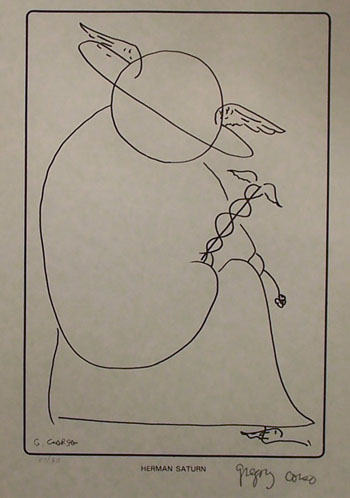
Herman Saturn – Gregory Corso – 1981
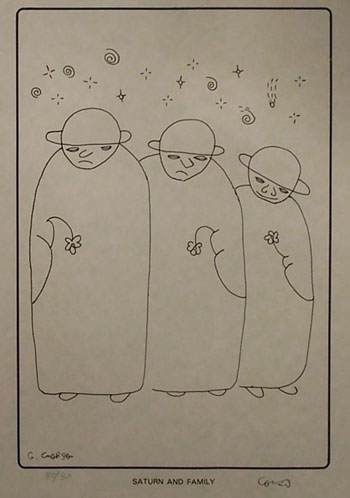
Saturn and Family – Gregory Corso – 1981
In a Greenwich Village bar in 1950, the year of his release from prison, he met Allen Ginsberg, who introduced him to experimental poetry. In 1954 he moved to Boston, where again he devoted himself to the library—this time at Harvard University. His first published poems appeared in the Harvard Advocate in 1954, and the publication of his first book, The Vestal Lady on Brattle and Other Poems (1955), was underwritten by Harvard and Radcliffe students. Corso worked at times as a laborer, a newspaper reporter for the Los Angeles Examiner, and a merchant seaman.
The following year he went to San Francisco, where he performed readings and interviews with Ginsberg and Jack Kerouac and became known as one of the major figures of the Beat movement. From 1957 to 1958 Corso lived in Paris, where he wrote many of the poems that became his book Gasoline, which Lawrence Ferlinghetti /City Lights Books published in 1958. From 1970 to 1974 Corso worked on a manuscript that was to be titled Who Am I—Who I Am, but the manuscript was stolen. He did not issue another major work until 1981’s Herald of the Autochthonic Spirit. Among other notable books are Bomb (1958), The Happy Birthday of Death (1960), Long Live Man (1962), Elegaic Feelings American (1970), and Mindfield: New and Selected Poems (1989).
Gregory Corso died on January 17, 2001, at the age of seventy.
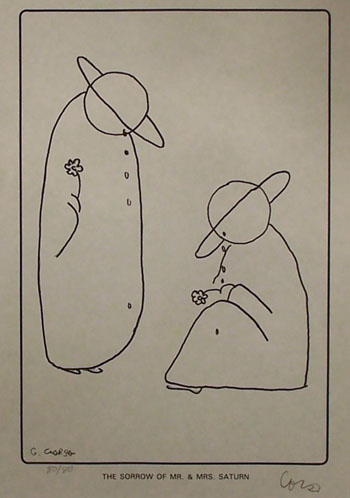
The Sorrow of Mr. & Mrs. Saturn – Gregory Corso – 1981
This rare set of prints is currently on exhibit in The Over the Moon Gallery of The Purple Moon.

Comments are closed.